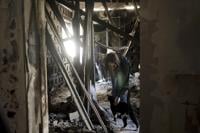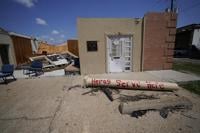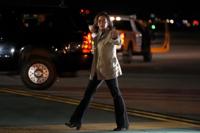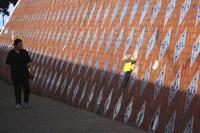KIBBUTZ NIR OZ, Israel (AP) — Standing in the ruins of her home in the Nir Oz farming village on the Gaza border, Sharon Alony Cunio gazed at the skyline of Khan Younis, the Palestinian city where Hamas militants dragged her more than three months ago. Her husband, David, remains captive in Gaza.
He’s kilometers away but completely out of reach.
Cunio and her 3-year-old twins from Gaza on Nov. 27. They are physically healthy, safe. But she can't stop thinking about her husband's last words to her. He was skinny and frail, wounded in the leg, as the family embraced for a final time in captivity.
“Fight for me. Don't give up," she said he told her. “Please yell what I cannot yell. I'm scared as hell.”
David Cunio is among scores of captives believed to be alive in Gaza after 120 hostages, including his wife and daughters, were freed during a .
As days spin by, punctuated by reports that other hostages have died in captivity, those freed have increasingly spoken out about the conditions they endured. With the plight of the remaining hostages gripping the nation's attention, those who survived hope to pressure the government into .
In an interview with The Associated Press, Sharon described and her time in captivity, most of which she said was spent — bolstering Israel's claims that Hamas has abused protected medical locations for military purposes.
Her girls, Emma and Julie, don’t yet understand what happened to them after Hamas militants rampaged through southern Israel on Oct, 7, killing 1,200 people and kidnapping 250. The Hamas attack prompted on the Gaza Strip.
In captivity, she told the girls the near-constant sounds of bombardment were thunderstorms and the militants who guarded their door were their protectors. Now, when it rains in Yavne, the central Israel city where the three are staying with Sharon’s parents, the girls ask, "Mommy, where are the booms?”
____
On the morning Hamas militants attacked, the family cowered in their fortified safe room. David Cunio muscled the door shut against the intruders, his wife said, but they eventually flicked on the gas and lit the house ablaze.
David grabbed Julie and climbed out the window. Sharon said she started to lose consciousness, and her sister shook her, saying “Let's open the window and get out. It's much better if they shoot us. Then there will be no pain, no suffering.'”
But militants didn’t shoot them. They dragged them, with four others, to Gaza on a stolen tractor.
The family lost one of the twins — Emma was gone, and they feared it was for good.
Sharon said she, David and Julie spent 10 days in a Palestinian home, guarded by two militants. On day nine, the house next door was bombed. As the walls around them crashed in, David and Sharon climbed on top of Julie. Glass pierced Sharon's scalp.
Soon, the captors moved the family. Sharon said militants covered her husband in a sheet so he looked like a corpse and dressed her in traditional Arab clothes. They packed the family into an ambulance and brought them to a hospital Sharon now recognizes from the news as Nasser, in Khan Younis.
Three days later, Sharon said, she heard crying outside their room. It was Emma.
“This guy just handed me Emma, like she’s a box or something. And I was shocked,” she said. “She was panicking and crying. I couldn’t believe that they brought her back.”
They spent the weeks in a room on the hospital's first floor. Stacked boxes separated the hostage section from the rest of the floor, Sharon said. She described sleeping with the girls on a small bed, using a bloodstained pillow. At one point, she said, 12 hostages were packed in the room. Nearby, they learned, were two additional rooms of captives, nearly 30 in total.
The Israeli military has come under international criticism for the forced evacuations and closures of more than half of Gaza's hospitals during its offensive, leaving the medical system . Israel has repeatedly of storing weapons and hiding hostages in hospitals in an attempt to justify military operations at the facilities.
Cunio said some captives received medical treatment from hospital staff. When one in her room grew sick, she said, he was taken away, returning with an IV. One hostage underwent leg surgery, she said.
Food didn't come on a regular schedule, but most days captors brought two meals. Sharon described spicy rice topped with meat, and often-moldy pita bread with feta. Cunio lost 11 kilos (24 pounds) and said they each suffered from vomiting and diarrhea at least once.
“A lot of the times, the girls were just crying, saying ‘I’m hungry,’" she said. “It was devastating.”
For the last week of captivity, militants moved the hostages into an outer room, with a window. Cunio said she saw rows of displaced Palestinians camped around the hospital.
Sharon said David, an electrician born and raised in Nir Oz, blamed himself — he was the reason the family lived near the Gaza border. He once beat himself until he bled inside the mouth, Sharon said. Other times, he managed a bit of levity.
“I would tell him, ‘You’re the best man I have ever known,’” Sharon said. "And he told me, ‘It’s about time you figured that out.’”
One day, Sharon said, David was pulled out of the room to speak with a Hamas officer who told him Israel had decided to bring back only women and children.
“We sat there for three hours, just hugging. Me, him, and the girls," Cunio said. "The girls are crying. ‘Why are you leaving? Why are they taking Daddy?’”
Three days later, Red Cross vehicles ferried Cunio and the girls back to Israel.
____
Now, Sharon said she won't be able to sleep through the night until David comes home.
“Everything is full of blame," she said. ”Taking a shower, eating hot food, smoking a cigarette, playing with our girls, being outside when he’s in the tunnels."
On Monday, Sharon toured Kibbutz Nir Oz for the second time since her release. Neighbors collected belongings from ransacked houses.
Sharon said the family won't return to the kibbutz, whose idyllic flowering paths and orange groves now give way to homes pockmarked by bullet holes.
Sharon sends the girls to preschool each day and hugs them at night, soothing them through their nightmares.
When she gets a moment to herself, she turns to an archive of her husband's voicemails. “I love you, you’re the best,” he says.
“I promised him I'd fight for him,” Sharon said. “I won't stop until he comes back.”








































